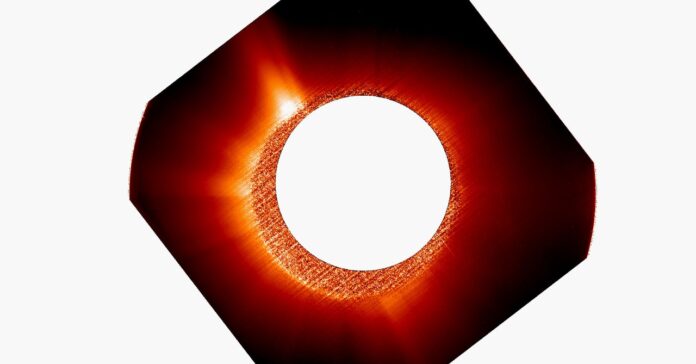The blazing floor of the solar froths with an especially sizzling electrically charged fuel referred to as plasma. The temperature on the fringe of this cosmic furnace runs at about 5,500 levels Celsius, however right here’s the true puzzle: By hook or by crook the solar’s environment, which surrounds that floor like a halo, is 150 occasions warmer.
“Why is the corona 1 million levels whilst the photosphere is at 5,500?” asks Yannis Zouganelis, deputy undertaking scientist for the Ecu House Company’s Sun Orbiter probe. “The primary downside is, we have now many concepts, many theories, however we don’t have any actual measurements.”
Till now. Closing yr, the Sun Orbiter swooped in for a close-up. It tested the corona from a distance of 140 million kilometers—shut sufficient to get excellent readings, however a long way sufficient away not to soften or harm its cameras. Much more crucially, thank you to a few astronomical choreography, engineers coordinated that maneuver with a flyby from NASA’s Parker Sun Probe to make the primary joint measurements of the corona. In combination, they pulled off observations neither probe will have made by itself, Zouganelis says. Their findings have simply gave the impression in a brand new find out about within the Astrophysical Magazine Letters.
The ESA’s Sun Orbiter carries a coronagraph, an tool referred to as Metis, advanced through scientists on the Italian Nationwide Institute for Astrophysics. It blocks out mild from the solar’s floor, permitting the probe to take pictures best of the corona. Imaging the corona intimately at optical and ultraviolet wavelengths lets in scientists to check the dynamics inside that sun environment and higher perceive the heating charge inside it.
NASA’s probe maneuvered a lot nearer, about 9 million kilometers from the solar. That probe lacks cameras, however it may well continue to exist within the solar’s environment and make measurements of its plasma and magnetic fields. That allows scientists to trace how warmth and effort transfer concerning the corona.
By way of the use of each spacecraft in combination, researchers at the two groups had the risk to mix simultaneous measurements and photographs. Most importantly, they decided that turbulence throughout the solar’s plasma contributes to the corona’s warmth—even though they’re no longer but positive how a lot. Plasma is largely a fuel fabricated from sizzling charged debris that emanate from the solar’s floor. Because it roils in opposition to the corona, it transmits warmth power outwards, a bit of like how the flames of a fireplace deplete power as they flicker.
“Combining the information from the 2 spacecraft, whilst they’re aligned however a long way aside, provides us the evolution of the plasma from one spacecraft [reading] to the following. Having that knowledge is so a very powerful,” says Nour Raouafi, the Parker Sun Probe undertaking scientist, who was once no longer concerned within the analysis.





 #shorts #shortsfeed #nature #youtubeshorts #iciness
#shorts #shortsfeed #nature #youtubeshorts #iciness